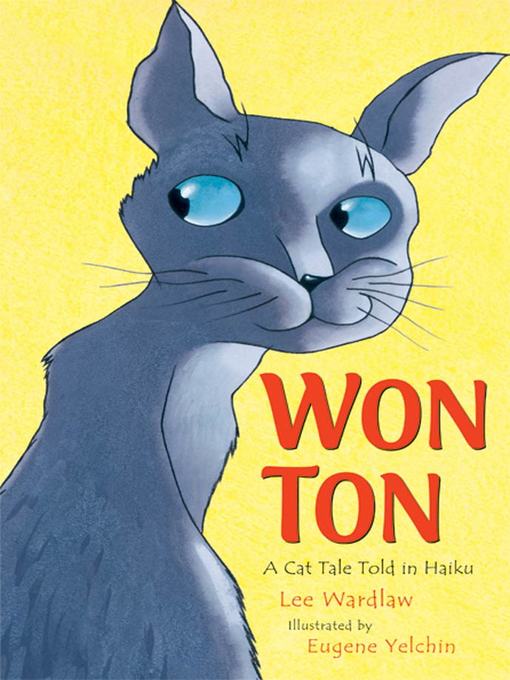
Won Ton
A Cat Tale Told in Haiku
فرمت کتاب
ebook
تاریخ انتشار
2011
Reading Level
0-1
ATOS
1.9
Interest Level
K-3(LG)
نویسنده
Eugene Yelchinشابک
9781429991056
- اطلاعات
- نقد و بررسی
- دیدگاه کاربران
نقد و بررسی

December 6, 2010
Wardlaw (101 Ways to Bug Your Parents) has a fine understanding of the feline mind, and each 17-syllable poem packs a big impact—especially in the first section, which imagines the emotional life of a cat in a shelter. "Visiting hours!/ Yawn. I pretend not to care./ Yet—I sneak a peek." Warily, Won Ton considers the boy who is his new owner—"Won Ton? How can I/ be soup? Some day, I'll tell you/ my real name. Maybe." In the final pages, boy and cat grow to trust each other, and Won Ton reveals his real name: "Boy, it's time you knew:/ My name is Haiku." Yelchin's (Seven Hungry Babies) sleek cat is all eyes and sharp angles. The Japanese haiku theme (technically, Wardlaw explains in a note, the poems are senryu, focusing on "the foibles of human nature") is carried through with elements and backgrounds lifted from old woodblock prints. The final page, a delicate painting of the boy nuzzling the cat, is a fitting reward for the boy's patience and Won Ton's resilience. A surprisingly powerful story in verse. Ages 4–8.

Starred review from January 1, 2011
In 33 senryu (Japanese poetry similar to and derived from haiku but focusing on human—or, here, feline—foibles instead of nature), Wardlaw relates the tale of a grey shelter cat. In his cage he thinks, "Gypsy on my left. / Pumpkin, my right. Together, / we are all alone." During visiting hours one day, though he takes pains to appear disinterested, the grey cat hopes the boy who rubs his chin just right will select him. He does! And after a scary car ride comes the naming. "Buster? Bubba? SPIKE? / Great Rats! Those don't befit an / Oriental prince." Won Ton might be what the boy calls him, but he has a secret name...he won't tell just anyone. Won Ton survives new food, being catnapped and dressed up and a trip to the backyard. And he finally calls the boy's house home. Wardlaw's terse, traditional verse captures catness from every angle, while Yelchin's graphite and gouache illustrations telegraph cat-itude with every stretch and sinuous slink. Perfect pussycat poetry for anyone who has ever loved a shelter cat. (Picture book/poetry. 4-9)
(COPYRIGHT (2011) KIRKUS REVIEWS/NIELSEN BUSINESS MEDIA, INC. ALL RIGHTS RESERVED.)

Starred review from February 1, 2011
Gr 2-5-Text and illustrations work together to craft an unforgettable character in a shelter cat whose veneer of cynical toughness masks his vulnerability. As he gazes from behind the bars of his cage, he quips: "Nice place they got here./Bed. Bowl. Blankie. Just like home!/Or so I've been told." He's adopted by a boy and his family, driven home ("letmeoutletme/outletmeoutletmeout./Wait-let me back in!"); and given a name: "Won Ton? How can I/be soup? Some day, I'll tell you/my real name. Maybe." Yelchin's superb illustrations, graphite and gouache on watercolor paper, depict an angular blue-black-haired Siamese, capturing all facets of his singular, feisty, and playful personality. Wardlaw relates his tale using a series of senryu, three unrhymed lines similar to haiku; in a note, he explains that the form focuses on "the foibles of human nature-or in this case, cat nature." The book's overall design, with text laid carefully between and around eye-catching, brilliantly composed illustrations, complements the engaging tale. Won Ton's sweetly humorous story will steal the hearts of readers young and old.-Marilyn Taniguchi, Beverly Hills Public Library, CA
Copyright 2011 School Library Journal, LLC Used with permission.

Starred review from February 1, 2011
Grades K-3 *Starred Review* Although the subtitle says haiku, as Wardlaw explains in her opening authors note, the poems that make up this picture-book celebration of the child-pet bond are actually written in similarly structured senryu, a form that focuses on personality and behavior instead of on the natural world, as haiku does. Here the central personality belongs to a feisty shelter cat who has never known cozy domestic life: Nice place they got here. / Bed. Bowl. Blankie. Just like home. / Or so Ive been told. Then a boy arrives, scoops the cat from his cage, brings him home, and names him Won Ton (How can I / be soup? Some day, Ill tell you / my real name. Maybe). Both the tightly constructed lines and elegant, playful illustrations unerringly imagine a cats world, including the characteristic feline seesaw between aloof independence and purring, kneading adoration. Like Bob Raczkas Guyku (2010), this title shows that poetry can be fun, free, and immediate, even as it follows traditional structure; The Car Ride, for example, reads, Letmeoutletme / outletmeoutletmeout. / Waitlet me back in! Yelchins expressive graphite-and-gouache artwork nods to the poetic forms roots with echoes of Japanese woodblock prints and creates a lovable, believable character in this wry, heartwarming title thats sure to find wide acceptance in the classroom and beyond.(Reprinted with permission of Booklist, copyright 2011, American Library Association.)




دیدگاه کاربران